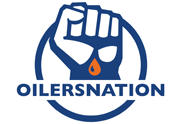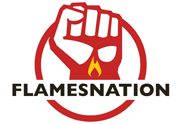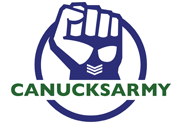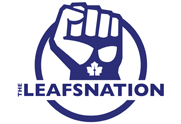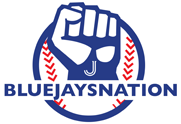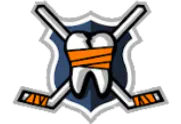Craig Coxe: In Depth
Craig Coxe’s reputation as being a great guy to interview stands up real well. He doesn’t mince words, is fair and self-critical, has great stories, and has a laugh for almost all of it.
Mike Kole: You only had 40+ NHL fights, unlike Bob Probert with nearly 300, and yet you have a lot of fans still, probably because of your open style. So, you didn’t have Probert’s fight totals or Joey Kocur‘s or Chris Nilan‘s, but you caught the imagination of hockey fight fans.
Craig Coxe: One thing I never did as a fighter was that I would never, ever jump somebody. The way I always felt was, if you’re going to get into a fight, let’s stand back and see who’s tougher. I never agreed to jumping a guy or suckering a guy. I’m going to grab ahold of you, you grab ahold of me and let’s see who can hit each other the hardest.
The majority of my fights weren’t because I enjoyed it or I was just looking for something to do. It was to help the team. If one of their guys is taking liberties, it’s my job to take care of that problem.
Kole: Have you seen any of the LNAH?
Coxe: I know a couple of guys who went up there. We call it the dumb-dumb league. They had tried to get me to come up a few years ago, when I first came up [to Michigan], when I ended my playing career. I told them, “Boys, you don’t pay enough for that.”
It wasn’t something that I just loved to do. Like a Probert, he loves to fight. I mean, he just loves it. It’s probably why he’s so good at it and why he had so many more than me. It’s fun if you’re involved in the game, but it sucks if you’ve been sitting there for 40 minutes of the game and the coach taps you on the shoulder and says, “OK, go get ‘er.” After a while, that gets old and difficult to do. I take my hat off to guys like Stu Grimson who did it for years. I respect guys who can do that. I just didn’t have it in me, and I started to rebel
Kole: When you say you didn’t have it in you, do you mean that you got tired of it?
Coxe: Yeah, I got sick of it. I knew I could play the game. I wasn’t going to be a 50-goal scorer or a first- or second-liner, but I could play a regular shift and had proven that I could do it. When you get traded, it’s the same thing all over again. You’re put in the role to be a dumb-dumb.
Kole: Is it because you made a reputation of having done it well?
Coxe: I’m assuming so, because some of my fights happened to be highlight fights, like me and Probie had some long ones, so coaches thought, “This is the only thing this guy can do”. Calgary was the only team that said to me, “We know you can fight. We don’t need you doing that. We know that you’ve been around long enough that you’ll know when to do it. We don’t have to tell you that. We’re going to teach you to be a better hockey player.” That was the greatest thing ever. Unfortunately, I didn’t get to stay there very long because of the Doug Gilmour trade.
Editor’s Note: Craig played in just 7 regular season games, and two playoff games for the Flames at the end of the 1987-88 season.
Coxe: That was the one team in the NHL that said, “We want you to be a player”. After a while, it gets to the point where you say, ‘You know what? Forget it.”
I got traded to St. Louis after my best year in the NHL. I was scoring points and did everything I was supposed to do. I got traded there, and all through the exhibition I’m playing on a line with guys who are playing regular shifts and had a great pre-season. And then in the first regular season game, bang. I’m stuck back on the fourth line, and I’m seeing maybe a shift a period. All Brian Sutter wanted me to be was a meathead. I said, “Forget it. I’m not going to do it.”
Kole: So you’re out of St. Louis, Chicago has you briefly, and then you’re on your way to San Jose?
Coxe: That thing with Chicago, I heard it later through the grapevine that there was a deal made. Chicago wasn’t going to protect one of the Sutter brothers. What was told to me, and who knows how true it is, but St. Louis said to Chicago, “If you pick up Coxe’s contract, we promise not to pick up Sutter in the waiver draft.” So they just picked me up, and Keenan said, “We’re not going to protect you. We’re not going to play you in any exhibition games. We hope that nobody really notices that you’re here.” Vancouver saw that I wasn’t protected, and that’s how I ended up back there. I was only in Chicago for three days. Vancouver picked me up in the waiver draft.
It was two more years in Vancouver. I played a little — a little up, and little down [in IHL Milwaukee]. And then Vancouver didn’t protect me, and that’s how I got to San Jose. In the expansion draft, they were allowed to take ten players. I actually think I might have been the tenth.
People have always asked me, “Is it hard?” No, it isn’t hard. “Well, you don’t always win.” I say, if I always won all my fights, I wouldn’t be a hockey player. I’d be making millions of dollars as a professional boxer.
This is part of the game, and I know that this is part of my job. I’m going to stand in there and do the best that I can. I never tried to say that I was the best. I could stand in there with the big boys. But my answer to them is, if I never lost, why would I be playing for this kind of money? If I like to fight that much, go be a pro boxer, make ten million a bout. Why not do that? Because I’m a hockey player, but I gotta do what I gotta do.
Kole: So in the second stint with Vancouver, did you get a chance to play?
Coxe: No.
Kole: So that was it? They said, “This is your role,” and that’s it?
Coxe: Yep.
Kole: If you rebel, they send you to the minors? To Milwaukee?
Coxe: Yep. That’s where I was that year. The one year I was up [with Vancouver] all year, but I only played 25 games.
Kole: They weren’t suiting you up?
Coxe: Yeah. Didn’t feel they needed me in the lineup.
Kole: So if the opposition didn’t have someone they felt they needed you to keep an eye on…
Coxe: Then there was no way I was getting in the lineup.
Kole: So, you go down to the minors. Do they tell you, “Hey, we really want you to do this job here”?
Coxe: They don’t tell you. They just say they’re going to send you down for a couple of weeks.
Kole: What do you do with that as a player? How do you sort through that? If you’re truly dedicated to be in the NHL because it’s what you want to do, you have to figure you have to work on something.
Coxe: For a lot of guys, that’s how they’ll take it. They’ll do the things they need to do to get back up there. I knew what they wanted me to do to get back up there, and that wasn’t going to happen.
Kole: So, where does that leave you?
Coxe: Where it left me was in a place I probably shouldn’t have gone. It […] got me into a lot of trouble. It means I started drinking a lot more, and then you get a bad reputation, that you’re spending a lot of time in the bar, and stuff like that.
That really did hurt me, because when I went to San Jose, George Kingston called me in the summertime and said that he’d talked to some of my previous coaches and previous teammates — he wouldn’t tell me who they were [and] I really wish I’d known who — and he said, “Do you know that you have a problem with drinking?” I said, “No, I don’t have a problem with drinking. These are the reasons I’ve done it. I know this is my last chance. I promise you it won’t be a problem.” And the whole time I was in San Jose it was never a problem.
See, me and Link Gaetz played together, and both of us had bad reputations off the ice. I told Gator — we had been friends for a long time because we would skate together in the summertimes in Vancouver — I said, “Gator, I’m not going to be partying with you if you’re going to be getting hammered and getting into fights. You’ll have to find somebody else to hang out with." So, he was really good. We never had any problems. We’d sneak out on our own, go to a little hole in the wall, have a couple beers and then go home. We knew nobody could see us out, or we’d be labeled again. We did everything we were supposed to do. So, why San Jose sent me down, I have no idea.
Kole: You must have figured that being picked up by an expansion team was a real good chance to play the game.
Coxe: Oh, I was real happy, and I thought I was in a good situation. But, see, many NHL teams aren’t going to tell you the truth. That’s an unfortunate thing. By this time I had played long enough, and I could read between the lines.
When I got sent down, I had scored a couple of goals, I was fighting, I was in the top-5 on our team in plus/minus, and we were a team that wasn’t winning any games. The last game I played was in New Jersey, that we lost nine or ten to one. My line was the only one that was even. Everybody else was down, quite a bit. So the next day they sent me down. I said, “Hey, hold on here, fellas. It’s not my fault, and it’s not my line’s fault that we’re losing these hockey games. We’re doing our jobs.” “Oh, no, no, no, Craig. We’re just sending you down for two weeks. We’ve got a couple of guys that we want to bring up. They’re young. We want to see what they’re like. Then you’re coming right back up”.
I said, “Fellas, I’ve been around the block enough. If you’re sending me down, I am not coming back up. I know that, and you know that. Why don’t you just tell me the truth?” “No, no, no Craig. This is the way it is.”
As soon as they told me that, I knew I was gone. And they never brought me back up again.
They’d signed me to a two-year contract, making the most money I’d ever made in the NHL. Now it doesn’t seem like a lot of money, but $190,000 was a lot of money back then. It was a one-way contract, so even sending me to the minors, but I’m still making this money, this is why I couldn’t understand.
I said to them, “Fellas, I’m staying out of trouble like I promised you I would. I’m playing the game. I’m fighting when I need to be fighting. I’m doing everything I can do to make this hockey club better. Why can’t you be honest with me?” “No, no, this is just two weeks.” Fine. Whatever.
Kole: Do you remember who was brought up?
Coxe: Yeah, it was Jeff Odgers and David Bruce. I don’t hold anything against those guys. They’re just trying to get up there like anybody else. I know Odgers was a gamer. Worked real hard. I wouldn’t consider him a heavyweight.
Kole: No, probably a middleweight, but very game.
Coxe: But you lose your big tough guy, Link Gaetz, in a car accident, but you still don’t bring me back? To me, that just tells me…
I always thought they brought me there as a media ploy. See, I was born and raised in California. They were an expansion team in California. What better way to promote your team than to have the first California born and raised kid in the National Hockey League?
They brought all ten of us [Sharks’ initial draft veterans] to San Jose in the summertime for, um to be… well I wouldn’t call us ‘models’. But that’s where you got those goofy hockey cards.
Editor’s Note: Kole produces the Pro Set hockey card where Craig is wearing his Sharks #91 jersey, and a wristwatch.

Coxe: Yeah! Those ones there. Those are stupid! (laughing) Have you ever seen a guy wear a watch on a hockey card?
Kole: It’s great that you remember these.
Coxe: I don’t even wear a watch! We got those watches for playing the Russians. [Moscow Dynamo] came over and toured the NHL, and we got these watches. So, I just wore it to kind of show that I was a professional. It’s got the NHL logo on it. It’s the only time I ever wore it.
Kole: There it is. A second of your life, ruined for life.
Coxe: Exactly!
Kole: As a fan, you would look at cards like these, with the Sharks ’91’ jersey, and they’re putting you out there with [Brian] Mullen and these other veterans, well, he’s gotta be part of the plan.
Coxe: Yeah, I would have thought so. According to them I was. To sign me to the kind of two-year, one-way deal they did, with that kind of money, I thought, “I’m solid.”
[But] I had a feeling that something was going on when they wouldn’t let me leave the hotel, and the other guys were getting their houses.
Again, I had been around long enough that I could read between the lines. They thought I was just some idiot.
Kole: Once the NHL career was over, you did continue to play in the minors, in a couple of leagues.
Coxe: I always loved to play the game of hockey. I still do. There’s a group of guys I skate with every Monday night, and when the men’s league is short players, because I’m around the rink, I get to play. I didn’t want to stop playing just because I wasn’t playing in the National Hockey League. I was playing down in leagues where I was only making $400, $450 a week. I just loved to play the game. It was really hard for me to sit down and say, “Well, OK, what am I going to do? Am I now going to get back into the construction business with my family?” That wasn’t what I wanted to do, so I kept [playing hockey] until nobody wanted to pay me to do it anymore. (laughs)
Kole: I want to jump back to the Sharks’ camp. That was a tough lineup of guys. We mentioned Gaetz and Odgers, but there were other tough guys who didn’t have that as their primary role, like Bob McGill, or Neil Wilkinson, or…
Coxe: Both those guys went with all the big boys.
Kole: Perry Anderson, Kevin Evans for crying out loud, with his penalty minutes record
Coxe: Evers was awesome!
Kole: So you have all these guys at camp, looking around at each other, thinking they have to get a job there. Were they killing each other out there?
Coxe: No. We all respected each other enough to know not to beat each other up.
Kole: Sometimes camps can be like that.
Coxe: Yeah, but usually when you get the older guys, it’s not. When we were all younger, when I was younger and in training camp, I was looking to beat up anybody who looked at me wrong. But when you get older and you’ve been playing against each other, you gain the respect of each other not to do that. We know that when the exhibition season comes along, then it’s time to prove. Then you start fighting the guys over there.
Say you and me are going to room together all year, and we go out into a goofy scrimmage game and one of us breaks the other’s nose in a fight. How are going to be able to sit and look at each other all year long, especially when we have to room together on the road?
My first pro coach, Bill LaForge, was known for having real tough teams. That’s how I got to Vancouver. Before we ever got out on the ice, in the first meeting we had, he said to us, “I don’t want anyone fighting anyone in this training camp. There will be time enough for you to prove to me, and to this staff, how tough you are, in these exhibition games. I don’t want you hurting a teammate you might have to live with.” And I always remembered that. Unless I was challenged, then I’d stand up for myself.
Kole: The chances of being traded to another team with a guy you beat up are slim anyhow, right?
Coxe: Well, you know hockey’s a small world. Sergio Momesso was playing in Montreal during the one and only bench clearing brawl I was ever in. I pretty much started it.
Kole: You were laughing a lot during it, too.
Coxe: Well, yeah. Because I kind of never liked the French teams. My Dad’s from Canada. He was born and raised in Ontario. Me and my brothers and sisters were the first ones in our family brought into the States. He always used to tell us when we were kids “Frogs, frogs, frogs,” so I always kinda had a hatred towards them.
It all happened because of that French kid, [Claude] Lemieux. He’d done something to Stan Smyl, who was our captain, and I happened to be on the ice when he did it. So I got to Lemieux before he got to the bench and that’s what started the brawl.
Me and Sergio, we fought, and then we played in St. Louis together. We were real good friends. You understand that business is business. I fought with guys and drank in the bar with them afterwards. You tell each other, “Well, I think I gave ‘er to you,” and all that, but it’s just business. Most of the time. Sometimes there is hatred there, there really is, but to me it was just business.
Kole: Were there any times where it was personal?
Coxe: At times there were guys who rubbed me the wrong way.
Kole: But nothing like a rivalry, where every time you saw them you geared up and said, “Oh, I can’t wait.”
Coxe: Well, [Ken] Baumgartner. For some reason, I can’t figure out why, every time we played against each other, in his building, he wanted to fight. Any time he came to Vancouver, he wanted nothing to do with it. But whenever we’d go to L.A., he’d come skating over, “Hey Coxey! Wanna go? Wanna go? Wanna go? Huh? Huh? Wanna go?” “OK, Kenny. Let’s go.”
He loved it, you know? He did the whole Hulk Hogan thing. He was living in LA — I guess that will do it to you.
It wasn’t personal for me, and I don’t think it was personal for him. He just knew that we usually had some good fights, that the crowd would like it.
I can’t think of anybody that I just wanted to beat up because I hated him.
I always wanted to fight [Dwight] Schofield after the first time, because I got embarrassed on Hockey Night in Canada. We fought probably six or seven times after that.
Kole: In the minors and NHL?
Coxe: Yeah, and it never happened again [that is, a big win or loss]. You know, some days you win, some days you lose. It’s just the luck of the draw, who gets that one punch in.
Kole: You fought him in Calgary, in that handful of games there.
Coxe: Yep, he was in Winnipeg. We used to fight because we knew it had to be done. But it was nothing personal. When I was playing in St. Louis, he must have been retired, he came into the dressing room. Someone started to introduce us and I said, “Yeah, I know who you are,” and we kinda B.S.’ed for a little bit. We didn’t have any grudges there, it was just business.
Sometimes it’s a tough business, but it’s business.
Kole: I wanted to ask you about the incident in Madison Square Garden.
Coxe: That was just me being young and dumb basically.
Kole: What started that? Did a fan throw a beer?
Coxe: We were down by four goals at least, and they scored again, and it was late in the third period and the game was basically over. Some idiot comes over the glass and throws a beer right over Tom Watt’s head. Coaches are kind of like your goalies — you have to protect them. You’ve got to protect your teammates, and I didn’t take that real well. I thought that was just wrong.
I knew that I couldn’t get up and over to get him, but I happened to see the security guards taking him right down where I did see that the glass was low, and I thought I could get over it.
Again, it was stupid. I’m glad I didn’t get over, because if I would have, I really would have come out on the wrong end of that. Assault charges. The possibility of thousands of people beating the piss out of me. I don’t need that.
Sometimes, you’re just young. Sometimes I didn’t think before I would do things. It was just not being mature enough.
All I wanted to do was get one shot, that’s it. I just wanted to hit him once, because it was just wrong. If we’re beating them in their building, and you want to disrespect us like that, okay. I can see that, because you’ve been cocktailing up. But we were getting beat bad in your building, and you need to treat us like that? That’s just uncalled for.
Kole: Kocur
Coxe: Actually, that was one of the highlights of my career, because fighting those two and us winning 4-1 and me getting the second goal of the game gives me the game winner. That was a highlight.
I had fought Joey in the minors. We both turned pro the same year. He was playing in Adirondack, and I was playing in Fredericton, as rookies. Both of us knew, we’re young, we’re coming out of two different leagues — he was Western League, I was in the Ontario League — and we’re both trying to make a name for ourselves. So, you know, in the minors, I didn’t know who he was. I just heard he was a tough young kid. So we fought and he broke my helmet he hit so hard. I was sitting over there in the penalty box with two pieces of helmet, and I said, “Boys! I’m going to need another one of these over here!” (laughs)
So, I knew how tough he was. With him, you don’t want to get into a stand-up fight with him, because he hurts people. I mean, he ends guys’ careers. He ended [Jim] Playfair‘s career, the coach in Calgary. He basically ended Jimmy Kyte‘s career. Two guys who are much bigger than him, but he hits so goddamned hard.
Kole: Well, for that matter, he messed up his own hands, delivering those hits.
Coxe: Somebody told me he got a plate in there, he got them so messed up at one time. I don’t know if that’s true or not.
A couple of times, he’s come in here for the Red Wings alumni games. He’s a real nice guy. Real nice guy.
With him, that fight was a lucky one for me, because I know I don’t want to stand back and exchange punches with him, because he hits a lot harder than me. I know that if I can get him one good one on the chin, he’s going to go down, because with the chin, you hit anything on the chin, it goes right to the brain and makes your knees automatically buckle. Unfortunately I found that out the hard way. I know it works going both ways!
Kole: That’s an interesting thing, because it seemed like the guys who were able to get one in on you were the ones that employed a lot of hand speed. Troy Crowder, with those overhand rights. Nick Fotiu…
Coxe: Well, I hadn’t been fighting for quite a while before that Crowder fight. If you’re not in synch, you’re going to be slow. With me, any time I’m fighting a lot, I’m more on my game. But, if you’re not fighting a lot, you’re not really onto your game, and it takes you a lot to get it going. Him, he was a boxer. I was sitting watching highlight tapes of him walking through the NHL, beating the piss out of guys left and right, so I know that I’ve got to challenge this guy. I can’t let some rookie come up and take the whole West Coast. Unfortunately, it kind of ended up on a bad end for me.
Kole: So you guys really were studying tape at that time.
Coxe: Oh yeah. Sometimes, when I would watch a fight tape at home before a game, it would get me a little goofy. You would get so jacked up, you know? I remember a couple of games where I came in to the game just looking to rip somebody’s head off.
When you’ve done that role and you sit and watch it over and over about other guys, you get excited, and you start to… you want to start to get at it.
Kole: Well, you were doing it for preparation after all.
Coxe: Yeah, exactly. I really underestimated [Crowder]. I thought, “Okay, I fought these guys, too. I know…”
Kole: The guys he beat?
Coxe: Yeah, and I’m like “Ah, come on.” But, yeah, he hit real hard. Ooof! Real hard.
Kole: When you were going to meet up with a Crowder or anybody for that matter, after you studied tape, did you go in there thinking, “Okay, if I meet up with this guy, this is the way I’m going to go about it”? You mentioned the way you don’t want to trade ’em with a Kocur, so is that a kind of approach that you took?
Coxe: The one thing that I mainly looked for was, could they fight with both hands, and are they particularly predominantly right-handed or predominantly left-handed?
Any time you ever see me fighting [John] Kordic, I would never fight him right-handed. Always fight him left-handed.
I was fortunate enough that I could fight with both hands. I mean, I’m a predominantly right-handed fighter, but I taught myself that you gotta be able to go with both hands, so with him — because he doesn’t hit very hard — he throws punches a million miles an hour. But he never, they’re never coming back — it’s just all these little wee rabbit punches. He ain’t going to hurt you. So you can take four or five on the beak just to set him up, and that’s what I would do with him. “Go ahead! You ain’t gonna hurt me!” (laughs)
Kole: Well, he cut you didn’t he?
Coxe: Yeah, well. If you watch the tape where did I go, and where did he go?
Kole: He went to the bench, er, to the dressing room.
Coxe: And were did I go?
Kole: To the box.
Coxe: Exactly.
Kole: The rumor was that you broke his nose. Did you break his nose?
Coxe: I don’t know if I did or not, but I know I sent him to the dressing room. I had a little cut on my head that didn’t even need stitches.
Kole: Really? That looked like it was kinda running out there.
Coxe: Didn’t even need stitches. Well, you gotta remember, you get cut, you’re going to bleed. I didn’t even need stitches. A couple of a little stereostrips and I was in Shadeberry later that night.
Kole: So the famous goaltender Gerry Cheevers had his mask with the stitches on there. If you had a mask and had to draw stitches, how many would you have? Do you know how many you took?
Coxe: No. I think the most I ever took in one year was close to 30. Well, the fight with Brownie was 15 alone. Then I had [Don] Jackson just a few days later.
Kole: But you knocked him down.
Coxe: But he hit pretty hard. He still cut me open. He cut me open on the forehead, if I remember correctly. I think I took four or five on that, so there’s 20 just in those two fights right there.
Luckily the eyebrows protect, or cover a lot.
Kole: Now, the fight with Brownie, you get up and he’s yelling at you and you were laughing. Do you remember…
Coxe: Oh, no no no. […] I wasn’t laughing. I was pissed.
Kole: It looked like you were laughing.
Coxe: He jumped me. With a guy like me, he shouldn’t have done that.
Kole: That you would have been willing to face him up.
Coxe: Yeah. He shouldn’t have done that. I went to hit him, and he cross-checked me in the head, so, I kinda went down. I’ve watched this tape over and over to find out what I did wrong. So as soon as I get up and start to turn around, his gloves are off, and he hits real hard. You take four or five from him before you even get your gloves off, it’s going to take you a bit to get your bearings. I do start to get my bearings and I get dinged with another one. By that time the ref said “Hey listen, I think this guy’s had enough.” If it was me, I would say, “Just wait until I fall down, because I want to get back into it.”
So, when I got close to him, I told him, “That’s wrong. The next time you and me play, we’re going again,” and he said, “Okay, no problem.”
Kole: You never did, though did you?
Coxe: I don’t know if we ever played against each other.
Kole: Well, there you were on a western team, and he’s in Philly.
Coxe: Yeah, but he came out and played in Edmonton. When he came out there, it was right after I got beat up by Crowder, and they brought Gino Odjick up, and Gino fought him two times in the same game. I never saw another game for the Canucks.
<


